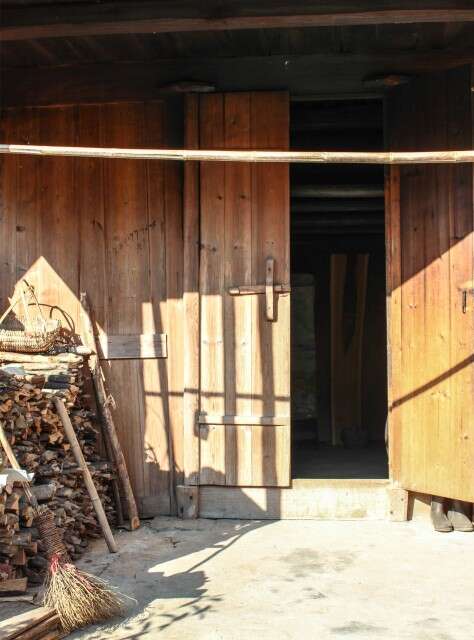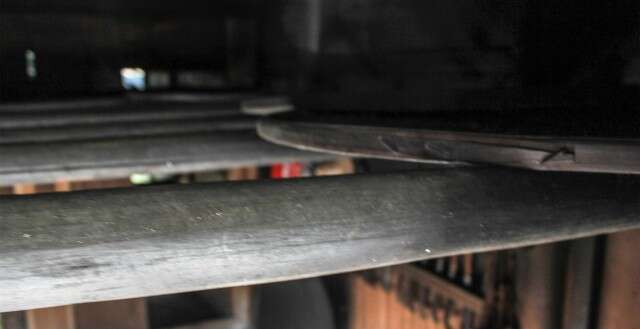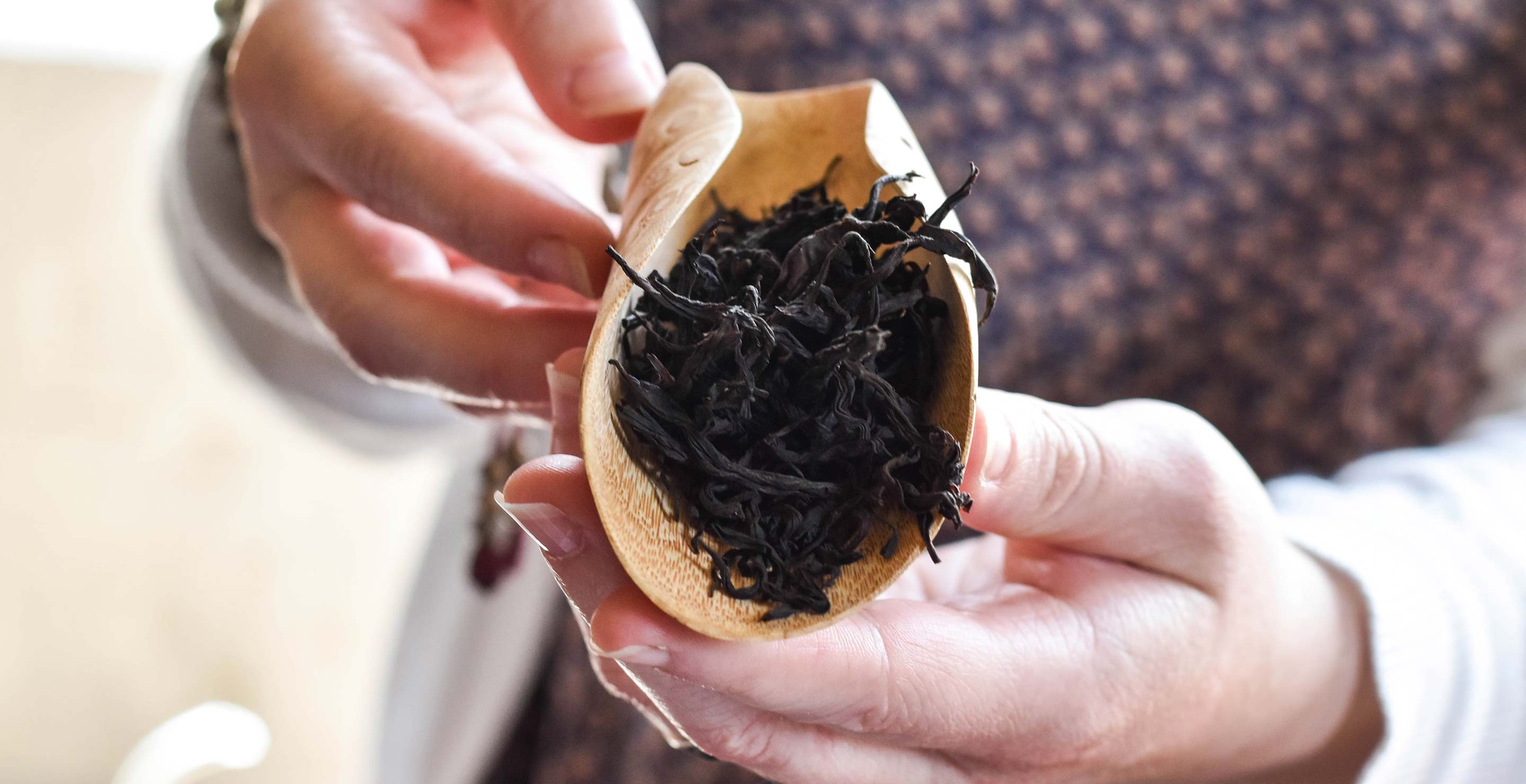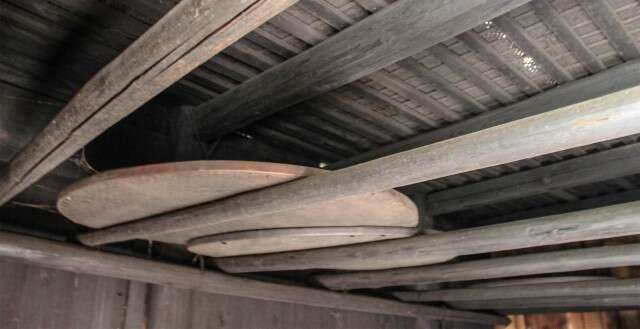Long ago, our our partner farmer Li Xiangxi’s ancestors in Wuyishan cultivated green tea deep in the mountains flanking the river in Tongmu. Not until the Ming Dynasty did circumstance and a strange accident bring black tea to China, and to the world at large.
According to legend, a platoon of soldiers decided to cross Huanggang Shan in the Wuyi mountains to travel from Jiangxi to Fujian. One night, they stopped to rest in Tongmu and commandeered a local farmer’s home to sleep. They rested on piles of fresh green tea leaves that had been withering in the family courtyard. This tea was allowed to fully oxidize before the farmers could collect it and finish it the next day. The result was a deep red tea with a sweet and mild taste.
Over time, farmers grew accustomed to the flavor of black tea, preferring it for its easier, gentler effect on the stomach and its honey-sweet flavor. This early black tea was made from the same Xiaozhong varietal leaf that Li XIangxi and her family use today to pick and process their teas in Tongmu, which benefit from the rocky volcanic soil, cold nights, sweet spring water, and rich biodiversity of the Wuyi Ecological Preserve.

 Click to watch
Click to watch
This summer we were extremely excited to taste the freshest harvests of Wuyi Gongfu Black and Zheng Shan Xiao Zhong, along with two brand new offerings, a smoked and unsmoked black tea wildly propagated and finished within the Tongmu preserve!
In this back-to back tasting, we got a chance to better understand the effects of very specific micro-climates and masterful smoking techniques on the Li Family’s incredible black teas.
We started with the fresh 2017 Wuyi Gongfu Black.
This tea is grown on a hillside in a ravine that collects a pocket of natural mist all morning, the tea buds slowly, yielding an incredibly sweet brew. The tea picks up mineral texture from rocky soil and the natural spring water running through the Li Family’s plot.
The initial aroma reminded us of masa corn flour, sprouted grain, lime peel and honey. The first sips were so rich and texturally engaging that they evoked sparkling Italian mineral water with the tingling texture and the sweet minerality. A woody, tatami-like aroma came through mid-palate followed by a raw cane sugar sweetness.
As we continued to steep out the tea, big spice notes started to emerge with cinnamon and ginger, accented by rich cocoa flavor. Tangerine peel and honey lingered in the aftertaste.
This year’s Wuyi Gongfu Black brings more textural punch to the table, accenting the smooth sweet dessert qualities we know and love in this tea with a deep rich backbone, a beautiful addition that we have the perfect spring weather conditions to thank for.




Next we moved to the Li Family’s traditional, old-school smoked Wuyi black tea: Zheng Shan Xiao Zhong.
The very earliest black teas were dried and roasted in a wok heated with pine wood, which accented their flavor with a light, natural smokiness. The Li Family recreates this light balanced smoke profile in their subtle and balanced pine-smoked Zheng Shan Xiao Zhong.
The wet leaf aroma is deceptively smokey, like a cozy campfire in a wet forest, but the initial sips reveal an elegant, balanced and sweet brew. Instead of deep smoke flavor, we tasted dried longyan (dragon eye fruit) and lychee, accented with pine.

As the tea continues to steep out, the smokiness lingers as an accent to bring forward the mineral flavors of the tea and builds up as a cooling light yun textural sensation. Lingering notes of chocolate paired beautifully with the smoke and dried fruit.


Wild Tongmu Zheng Shan Xiao Zhong – both smoked and unsmoked – is picked one young leaf at a time, entirely by hand, and entirely by native residents living within the reserve. The tea plants are wildly propagated by seed, and are left untended. This natural selection creates genetic variation and diversity between each standalone tea bush. Each bush grows between one and three meters high, and grows out of cracks in the volcanic rock of the Tongmu mountains.
Tongmu is a tiny region that has been designated for special protection and recognition. Non-residents are not allowed into the preserve without special approval and sponsorship from a resident.
The region of Tongmu is unique within the Wuyishan region for its volcanic rock formations, and extremely thick vegetation coverage and biodiversity. Nestled along either bank upstream of the Jiuqu (Nine Bends) Brook, the mountains create a unique microclimate, perfect for many species of birds and a healthy ecosystem. Mountain spring water springs out of the ground and runs down every slope, and the rocky land and cold weather make for slow-growing but singularly incredible tea.
We were super excited for the chance to try a black tea picked and finished in the same place as the earliest black tea ever, and see for ourselves what made Tongmu’s terroir so special.
The initial aroma of the Wild Tongmu Unsmoked Zheng Shan Xiao Zhong immediately revealed the biggest difference- a thick creamy sweetness missing in classic Wuyi Black teas. Tongmu’s soil and water add an intense textural dimension worth savoring. We smelled thick rising bread and deep aromatic wood. The first steepings were full of the mossy old tree flavor we love in Old Tree Wuyi Gongfu Black, but rounded out with something fresh and vibrant.

As the tea continued to steep out, it began to reveal a rich and satisfying nutmeg spice, and a fruity apricot flavor. The texture and balance of this tea made it more like tasting an oolong or even a sheng pu’er than a traditional black tea.



After such an exquisite taste experience with the unsmoked Wild Tongmu black tea, we were super curious about the Li Family’s smoked version of the same tea.
We had just come back from visiting the Li Family’s ancestral home in Tongmu, built entirely of wood, where Li Xiangxi’s older brother finishes and smoke the family’s tea. Li Xiangxi’s parents manage the family’s local pine wood collection and select and dry each piece of wood perfectly to minimize actual smoke and maximize the release of oils and resins. The goal is to release the deep foresty flavor of the pine without getting too much actual wood smoke into the tea.


The aroma of the wet leaf reminded us of deep forest and a distant campfire. All the wet pine and moss was present. The first sips of the tea revealed an incredibly rich, thick and creamy textural experience, like sipping frothed cream with roasted chestnuts. As the tea continued to steep out we picked up lychee fruit and vanilla in the aftertaste.


In late steepings, a hot cedar sauna aroma started to emerge, followed by a salty, chocolatey sweetness like cookie dough!

Throughout every steeping, the tea maintained a perfect balance of wood aroma, creamy mouthfeel and lingering mineral rock aftertaste. The smoke crafting in this tea only served to reveal the beautiful complexity of each leaf, not overwhelm or transform.
This delicious Wuyi black tea is a work of incredible craftsmanship, and a must-try for black tea lovers!!





 How To
How To Myths & Legends
Myths & Legends Travelogue
Travelogue Tasting Journal
Tasting Journal Talking Shop
Talking Shop Tea 101
Tea 101 Watch
Watch Teaware
Teaware News
News



















Leave a Reply